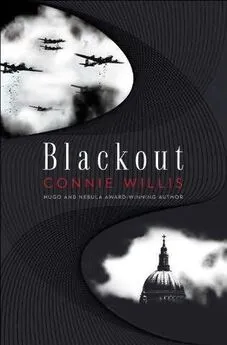Connie Willis - Blackout
- Название:Blackout
- Автор:
- Жанр:
- Издательство:неизвестно
- Год:неизвестен
- ISBN:нет данных
- Рейтинг:
- Избранное:Добавить в избранное
-
Отзывы:
-
Ваша оценка:
Connie Willis - Blackout краткое содержание
In her first novel since 2002, Nebula and Hugo award-winning author Connie Willis returns with a stunning, enormously entertaining novel of time travel, war, and the deeds—great and small—of ordinary people who shape history. In the hands of this acclaimed storyteller, the past and future collide—and the result is at once intriguing, elusive, and frightening.
Oxford in 2060 is a chaotic place. Scores of time-traveling historians are being sent into the past, to destinations including the American Civil War and the attack on the World Trade Center. Michael Davies is prepping to go to Pearl Harbor. Merope Ward is coping with a bunch of bratty 1940 evacuees and trying to talk her thesis adviser, Mr. Dunworthy, into letting her go to VE Day. Polly Churchill’s next assignment will be as a shopgirl in the middle of London’s Blitz. And seventeen-year-old Colin Templer, who has a major crush on Polly, is determined to go to the Crusades so that he can “catch up” to her in age.
But now the time-travel lab is suddenly canceling assignments for no apparent reason and switching around everyone’s schedules. And when Michael, Merope, and Polly finally get to World War II, things just get worse. For there they face air raids, blackouts, unexploded bombs, dive-bombing Stukas, rationing, shrapnel, V-1s, and two of the most incorrigible children in all of history—to say nothing of a growing feeling that not only their assignments but the war and history itself are spiraling out of control.
Blackout - читать онлайн бесплатно полную версию (весь текст целиком)
Интервал:
Закладка:
“In,” Eileen said, “now,” and pushed her through the door. She grabbed Alf, who was standing on the grass, staring up at the dark sky, shoved him through the door, and stepped through after him. And into four inches of icy water.
It’s flooded, she thought, grabbing the torch and shining it down on the water and then along the walls to see if water was coming in somewhere. So this was what the neighbor meant by dampish.
“My shoes and socks are soaking,” Binnie said.
“I want to go back inside,” Theodore said.
“We can’t, not till the raid’s over.” She had to shout over the noise of the bombs and the Heinkel IIIs or whatever they were, their sound a heavy growl. Perhaps shutting the door would shut some of the racket out. She handed Binnie the torch and pulled the door shut and fastened it.
It didn’t help. The curved tin roof seemed to magnify and reverberate the sound, like shouting into a megaphone. How had people slept in these? She took the torch back from Binnie and shone it around the shelter. There were two very narrow bunks on each side, with shelves at the end by the door. On one sat an oil lamp with a glass chimney.
The hurricane, Eileen thought, lifting Theodore onto a top bunk, then waded over to light the lamp. It cast a dim, shadowy light.
“Look,” Binnie said, pointing. “There are spiders.”
“Where?” Theodore cried.
“In the water.”
Eileen replaced the glass chimney over the flame and switched off the torch. “It’s all right. They’ve all drowned.”
“Drowned?” Theodore wailed.
“I think the water’s gettin’ deeper,” Binnie said.
“No, it isn’t,” Eileen said firmly. “Get in your bunks. Binnie, you take that one.” She pointed to a lower bunk. “Alf, you climb up on top.”
“I want to go back inside,” Theodore said. “I’m cold.”
“Here’s your blanket,” Eileen said, picking it up. It was sopping wet. The tail must have dragged in the water. She took off her coat and tucked it around him.
“There’s no room in ’ere,” Binnie said from her bunk. “I can’t even sit up.”
“Then lie down and go to sleep,” Eileen said.
“With all that goin’ on?” Alf asked.
He had a point. The noise of engines and explosions was growing louder. There was a whoosh and then an explosion that shook the Anderson. The hurricane lamp rattled.
“Are we going to drown?” Theodore asked.
No, we’re going to be blown to bits, Eileen thought. And Binnie was right, there was no room in these bunks. She curled up on the lower one, shivering, her feet in their wet stockings tucked under her.
I should have knocked on Mrs. Owens’s door and run and left them standing there, she thought, her teeth chattering. I could have been home by now.
“I gotta go to the loo again,” Alf said.
Think of the Wounded
– GOVERNMENT POSTER, 1940War Emergency Hospital-August 1940
MIKE STARED AT SISTER GABRIEL. “I’M IN ORPINGTON?” he repeated stupidly. Orpington was just south of London. It was miles from Dover.
“Yes, you were brought here from Dover for surgery,” Sister Gabriel explained.
“When?”
“I’m not certain.” She picked up his chart to look.
“I am,” Fordham said. “It was the sixth of June.”
D-Day, Mike thought. Oh, God, it’s 1944. I’ve been here four years.
“I remember because it was only two days after I was admitted,” Fordham went on, “and the orderlies kept banging against my traction wires as they got you into bed.”
“Yes, the sixth,” Sister Gabriel said, looking at his chart, and it was obvious the date meant nothing to them. It wasn’t 1944, it was still 1940. Thank God. June sixth. That meant he’d been brought here a week after Dunkirk, so that by the time the retrieval team had talked to the Commander and then come to Dover looking for him, he’d have been long gone, and with no name to trace him by.
That’s why the retrieval team’s not here, he thought jubilantly, and then, I’ve got to let them know where I am. He grabbed the blankets to fling them off and get out of bed.
“I say, what do you think you’re doing?” Fordham said, startled, and Sister Gabriel rushed over to stop him.
“Oh, you mustn’t try to get out of bed,” she said, putting her hand on his chest. “You’re still far too weak.” She pulled the covers back up. “What is it? Have you remembered something about your coming here?”
“No, I… I didn’t realize I wasn’t in Dover.”
“It must be difficult, not being able to remember,” Sister Gabriel said sympathetically. “Could you have been in the RAF?”
Oh, no, had his L-and-A implant stopped working again?
“There are lots of American flyers in the RAF,” she went on. “You could have been shot down, and that’s why you were in the water.”
He shook his head, frowning. “It’s all so foggy.”
“Never mind. You’re in very good hands here.” She handed him his crossword puzzle and pencil. “And you’re much safer here than in Dover.”
No, I’m not, he thought. And I have to get word to them. But how? He couldn’t send a telegram to 2060. The only way to get a message to Oxford was via the drop, and if he could get there to send it, he wouldn’t need to send a message. He could go through himself.
He tried to think what the retrieval team would have done when they couldn’t find him in Dover. They’d have gone back to Saltram-on-Sea. It, and the Commander, would be their only lead. I have to get word of where I am to him so he can tell them. But how? The Commander obviously didn’t have a phone or he wouldn’t have had to use the one at the inn to call the Admiralty.
Maybe I could call the inn, he thought, and leave a message with the barmaid-what was her name? Dolores? Dierdre? He couldn’t just call and ask for the brunette with the trick of glancing flirtatiously over her shoulder, not with her father there. And besides, he didn’t trust her to remember to deliver the message. She hadn’t been able to remember that the Commander had a car, even when he’d been in desperate need of one.
Maybe he could send the Commander a telegram. But he had no idea how to go about it. And no money. And if he asked Fordham or one of the nurses if they could send one for him, they’d conclude he’d regained his memory and ask all kinds of inconvenient questions.
Maybe I can ask Mrs. Ives, he thought. She doesn’t know I’m supposed to have amnesia. Fordham goes down for X-rays this afternoon. I’ll ask her then.
But when she arrived, Fordham was still there. “Anything else you need?” Mrs. Ives asked cheerily after she’d given Mike his newspaper.
Yes, Mike thought, I need an attendant to come take Fordham. “Can you help me with this crossword clue?” he asked, picking one at random. “‘Mount where the PM goes on Sunday mornings.’ Nine letters. I can’t figure it out.”
“Oh, that’s Churchill,” she said.
“Churchill?”
“Yes, our new prime minister.”
And here, finally, was the attendant with the gurney. He and the nurse began unhooking Fordham from his pulleys. “But how is Churchill the name of a mount?” Mike asked to stall.
“A mount is a hill…”
“Careful,” Fordham said as they put him on the gurney. “Don’t-Christ!-sorry, Mrs. Ives.”
“I quite understand,” she said and returned to the puzzle. “And the place one goes on Sunday mornings is ‘church,’ and together they spell out Church-hill. Churchill.”
“So the clues are riddles?” Mike said.
Mrs. Ives nodded.
Fordham yelped in pain. “Sorry, just a momentary twinge. Go ahead, driver. To the photographer’s studio!” and was finally wheeled off toward the ward’s double doors.
“I need to get word to someone,” Mike said as soon as the gurney was out of earshot, “and I was wondering if you-”
“Could write a letter for you?” Mrs. Ives said. “I’d be delighted.” She began gathering stationery from her cart.
“No, I wanted to send a telegram-”
“Oh, dear, no. Telegrams are such horrid things, always bringing bad news, especially now with the war. You don’t want to frighten the poor person you’re sending it to. A letter’s much better.” She picked up a fountain pen. “I’ll be glad to post it for you.”
“But I need to get word to this person right away-”
“A letter will be nearly as quick as a telegram,” she said, sitting down beside the bed. “Now, to whom is it to be sent?”
“I can write it myself. I just need-”
“Oh, I don’t mind. It’s my way of doing my bit for the war effort. And you mustn’t tire yourself out. You must conserve your strength toward getting well.”
There wasn’t time to argue with her. Fordham might be back any minute. “It’s to Commander Harold,” he said.
She wrote, “Dear Commander Harold,” in a neat, spidery hand.
“I am in the War Emergency Hospital in Orpington,” Mike dictated. “I was brought here from Dover for surgery on my foot.” And now what? He needed to phrase it so it didn’t give away the fact that he’d been feigning his amnesia, or that he was a civilian. If they found that out and moved him to another hospital, it would defeat the whole point of writing.
Mrs. Ives was looking up at him expectantly.
“I’m too tired to write any more right now,” he said, rubbing his hand across his forehead. “Just leave it, and I’ll finish it later.”
“I’ll be glad to come back,” she said, folding the letter and sticking it in her pocket.
No, Fordham would be there then, listening. “Just put, ‘Please write,’” Mike told her. The important thing was to tell the Commander where he was, and hopefully he’d write back and tell him if anyone had been there, looking for him. “And sign it ‘Mike Davis.’”
She wrote that, folded the letter in thirds, put it in an envelope, licked the flap, tore a stamp off a sheet, licked that, and pressed it onto a corner of the envelope. And it was just as well she’d written the letter for him-he’d have had no idea how to get the envelope shut or the stamp on. She wrote Mike’s name and the hospital’s address in the left-hand corner and “Commander Harold” in the center. “What’s the Commander’s address?” she asked.
“I need you to find that out for me. He lives in a village called Saltram-on-Sea. It’s in Kent. Or possibly in Sussex.”
“The postmaster will know,” she said. “Saltram-on-Sea will get it to him.” She wrote “Saltram-on-Sea” and, under it, “England,” and stuck it in her uniform pocket. “I’ll post it when I leave tonight.”
I hope she knows what she’s doing, Mike thought. “How long do you think it will take to get there?”
“Oh, it should arrive with tomorrow’s morning post, though with the war, one never knows. It might not arrive till the afternoon post, but it will definitely be there by tomorrow,” she said, which meant it would get there Wednesday or, since it didn’t have the Commander’s address, possibly Thursday. That meant the retrieval team could be here by Friday. Which meant he’d better work on getting better, and fast, so that when they showed up, they’d be able to get him out of here without having to resort to stealing a stretcher and an ambulance. To that end, he forced himself to eat everything on his tray, and practice sitting up in bed for longer than five minutes at a stretch.
It was harder than he expected. He was still incredibly weak, and even trying to sit on the side of the bed left him drenched in sweat. “There’s still some lung involvement,” the doctor said, listening to his chest. “How’s the memory? Anything returning?”
Читать дальшеИнтервал:
Закладка:

![Jane_BlackCat - Понять не поздно... [СИ]](/books/1148838/jane-blackcat-ponyat-ne-pozdno-si.webp)
![Jane_BlackCat - За краем Вечности [СИ]](/books/1148839/jane-blackcat-za-kraem-vechnosti-si.webp)

